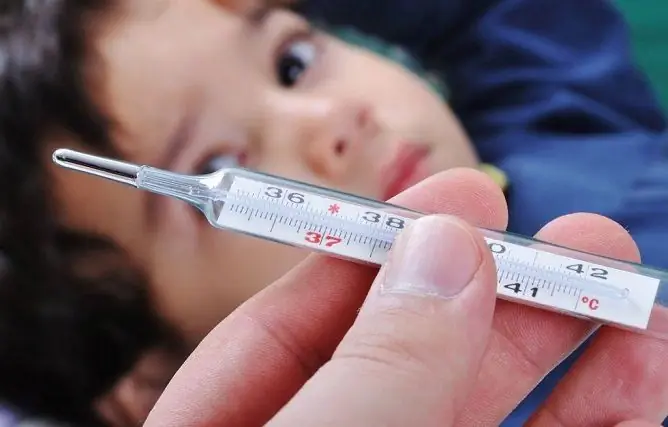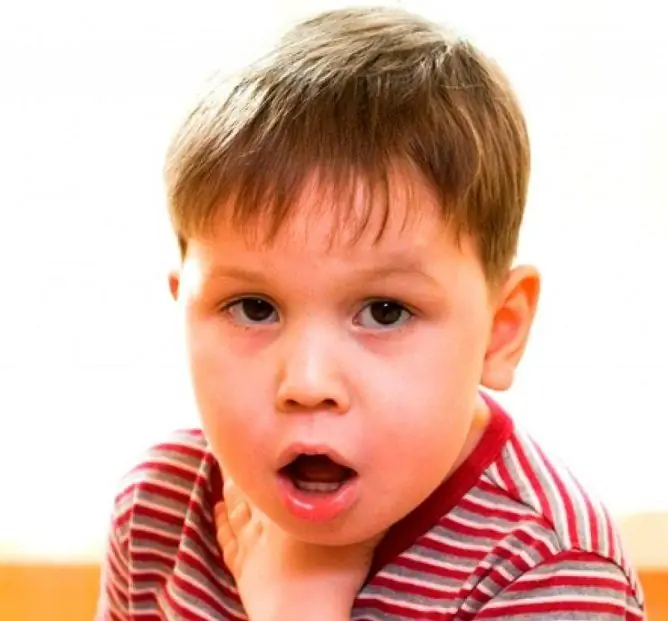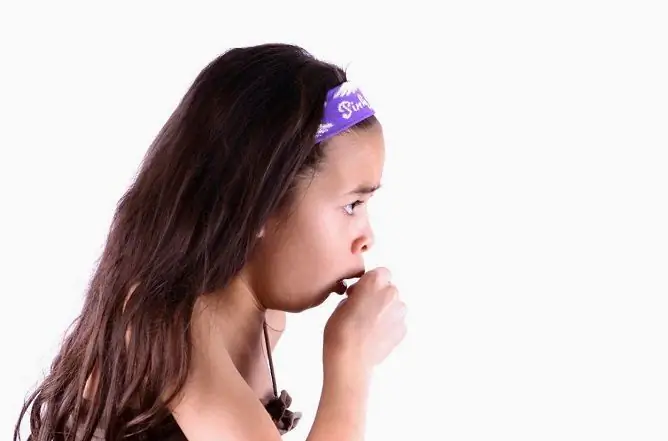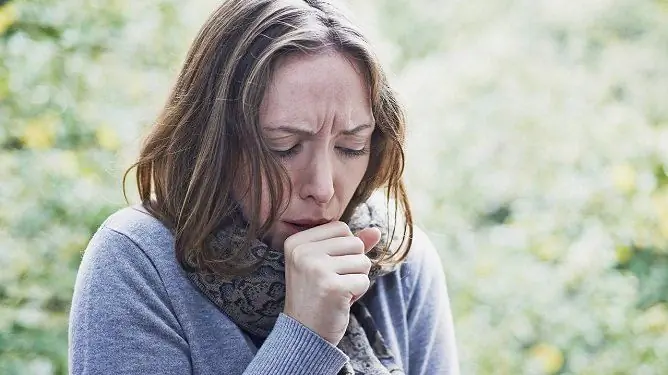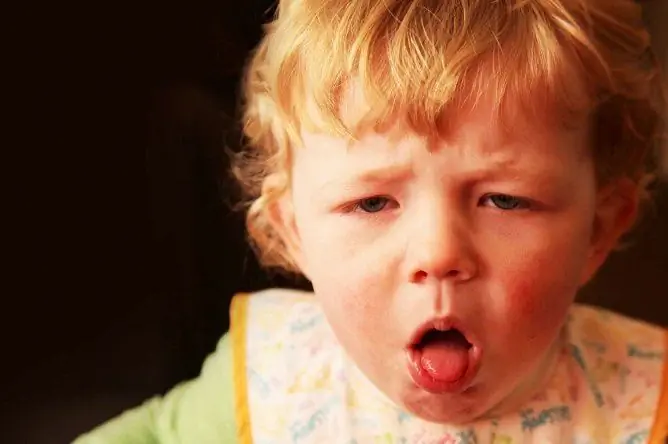- Author Rachel Wainwright wainwright@abchealthonline.com.
- Public 2023-12-15 07:39.
- Last modified 2025-11-02 20:14.
How to treat a child with a severe wet cough without fever
The content of the article:
- How to treat a wet cough in children
- Treatment of wet cough in children with alternative methods
- Reasons for the development of a wet cough at normal body temperature
- Moist cough for various diseases
- Video
A severe wet cough without fever in a child can be a sign of serious illness, for this reason, it should not be ignored and / or self-medicated.
The cough is a defensive reaction of the body, it can be dry or wet, depending on whether the patient has sputum. This symptom in childhood has its own characteristics. The respiratory muscles in young children are not yet sufficiently developed, therefore, it is more difficult for patients of this age group to cough up accumulating phlegm, and therefore, diseases accompanied by a wet cough take longer for them.
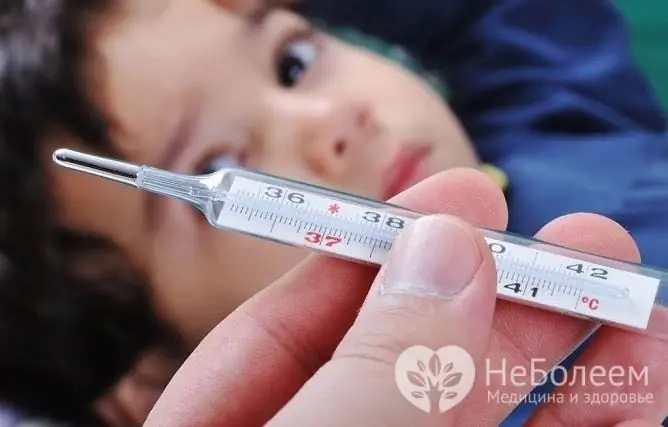
A normal temperature is not a sign of easy illness.
It is highly discouraged to treat a child on your own, especially for babies in the first years of life. Many parents think that a lack of fever means that coughing is not dangerous. This opinion is wrong. Any cough in children that takes on a stubborn nature requires a visit to a doctor.
In the absence of complications, treatment is usually carried out at home by parents or other adults under the supervision of a doctor, but in some cases, when a wet cough appears, hospitalization is required.
How to treat a wet cough in children
Before using any medicines, you need to carefully study the instructions for use, make sure that there is no individual intolerance to the components of the drug, you should also strictly adhere to the dose and frequency of administration of the drug prescribed by the doctor.
Mucolytic, expectorant drugs can be prescribed to dilute sputum and facilitate its removal from the body.
The use of expectorants before bedtime can cause sputum to drain at night, leading to increased coughing and sleep disturbances. Therefore, it is recommended to give such drugs a few hours before going to bed.
When treating children, expectorants in the form of syrup are usually used. Such preparations usually have a pleasant sweet taste, which is important for children.
Inhalation helps with a wet cough. Inhalation can be steam or carried out using a nebulizer or spray. In children, steam inhalations are not carried out, moreover, they are useless for a productive cough. Nebulizers are a different matter. For inhalation use a solution of baking soda and / or salt, alkaline mineral water, medications. The attending physician prescribes the drug. Inhalation should be carried out under strict adult supervision. At the first signs of trouble (increased coughing, shortness of breath, redness of the face, etc.), the procedure is interrupted, the problem is reported to the doctor.
In some cases, physiotherapeutic methods, drainage massage, and breathing exercises provide a good therapeutic effect for a wet cough. Spa treatment is indicated for patients with chronic diseases of the respiratory system during periods of remission.
In the room where the patient is, it is necessary to regularly wet cleaning, ventilate the room and humidify the air (especially during the heating season). To facilitate the elimination of sputum, the patient is shown an abundant drinking regimen. The child can be given tea with lemon, honey or raspberries, fruit drinks, fruit and berry compotes, warm mineral or plain water, milk with honey, butter or figs.
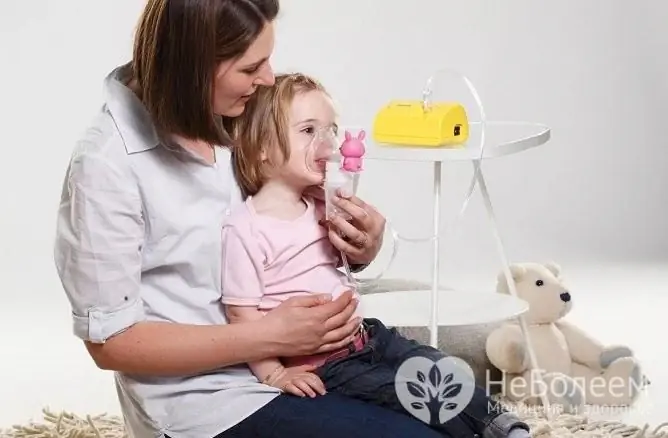
Inhalation for children is carried out using a nebulizer and only under the supervision of adults
Treatment of wet cough in children with alternative methods
In addition to the main treatment for wet coughs in children, folk remedies can be used. The main contraindication to their use is usually individual intolerance. Nevertheless, it is imperative to consult with your doctor about their use - some folk methods and remedies can be dangerous in certain conditions.
For a wet cough, homemade preparations are used with licorice root, coltsfoot, elderberry, sage, thyme, St. John's wort, chamomile, ivy, plantain.
To prepare an effective remedy for wet cough in children, you need to peel and chop 2-3 medium onions, pour milk and cook until the onions soften. After that, honey is added to the hot (not boiling) liquid at the rate of 1 teaspoon per 1 glass of liquid. The agent is taken 1 tablespoon every hour for 1-3 days.
A mixture of radish juice and honey helps with coughing well. To prepare the product, take 1 small black radish, from which the top is cut off and part of the pulp is cut out so that a depression is formed in the vegetable. Place 1-2 teaspoons of honey in the recess, cover with the top and leave the radish at room temperature for 4-5 hours. During the specified time, juice will be released, which will mix with honey. The finished product is taken 1 teaspoon 3-4 times a day. A fresh portion of honey can be added to the radish several times (while the juice is secreting).
The black radish and honey remedy can be prepared in another way. To do this, two small radishes are peeled, cut into small pieces, placed in a jar in layers, between which are placed several tablespoons of honey. The filled container is left for several days in a cool place to release the juice. The remedy is also taken 1 teaspoon 3-4 times a day.
To prepare another remedy for wet cough, you need to thoroughly wash the cedar cone and boil it in 1 liter of milk for 1-2 hours over low or medium heat. Filter the finished product, add 4-5 tablespoons of honey and take 1/4 cup every 2 hours.
An effective remedy for a strong cough is a mixture of blackcurrant juice with honey in a ratio of 1: 1.5, it is consumed 1 tablespoon 3 times a day.
With a strong cough, an infusion of calamus rhizomes can help. For its preparation, 1 tablespoon of plant roots is poured with 1 glass of boiling water and insisted for at least half an hour. The infusion is drunk in 2/3 cup 30 minutes before meals.
To prepare a warming cake, which helps well even with an advanced cough, mix equal amounts of honey, vegetable oil, mustard powder, goat fat, vinegar. A cake is formed from the mixture, which is applied to the chest or back in the projection of the lungs, fixed and left for several hours (it is possible overnight). After fixing the cake, the patient should be wrapped in a warm blanket.
For warming compresses, you can use honey, vegetable oil and flour (mixed in equal amounts), boiled potatoes, heated cottage cheese, etc.
Reasons for the development of a wet cough at normal body temperature
A wet cough at normal temperature can be a symptom of many diseases, for this reason, before starting treatment, it is necessary to conduct an examination and establish the cause of its appearance.
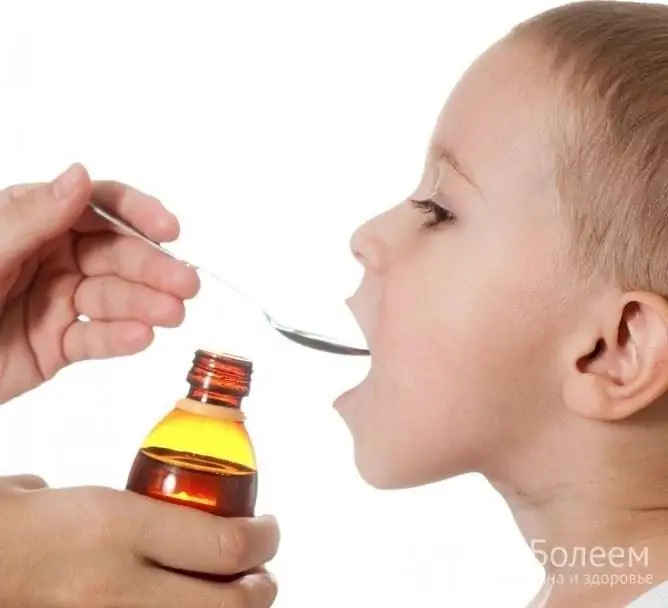
Treatment of cough in children should be carried out only under the supervision of a doctor.
The cough reflex is aimed at cleansing the airways from irritants that have got into them, or products of the pathological process. The onset of cough occurs under the influence of exogenous or endogenous factors. A rare cough (5-10 cough tremors per day) is normal, it can develop in children during the day, but especially after a night's sleep.
Coughs can be caused by inhalation of dust, foreign bodies, chemical fumes, cigarette smoke, allergens, and inflammatory diseases of the respiratory system.
In infants, this type of cough can occur when a large amount of milk is swallowed during feeding. A wet cough in a child during teething may be due to the profuse salivation that accompanies this process.
A moist cough can be caused by a respiratory tract infection. In this case, the disease can have a viral or bacterial etiology, and a cough can also develop against the background of a fungal infection, some helminthic invasions.
A cough with sputum at normal body temperature in children can occur a few days after the onset of the disease (tracheitis, bronchitis, pneumonia, lung abscess, etc.), before that it is dry.
A wet cough at normal body temperature can be a sign of an allergic reaction, in which the cough is not accompanied by the clinical signs usual for respiratory diseases.
Moist cough for various diseases
Acute respiratory diseases, in addition to coughing, are usually accompanied by an increase in body temperature, hyperemia of the mucous membranes of the throat, pain or discomfort in the throat, nasal congestion, and runny nose. However, with a reduced activity of the immune system, the temperature can remain within normal limits.
In diseases of the upper respiratory tract, there is often an abundant secretion of mucus, which flows down the nasopharynx and causes the development of cough, but in this case it is unproductive, and nasal mucus is taken for sputum. The patient's body temperature can remain normal. In addition to coughing, wheezing is heard, especially in the morning due to mucus accumulated during the night. In young children, a severe cough often causes vomiting.
Lack of temperature with a wet cough is noted in chronic respiratory diseases. In this case, the cough develops periodically during exacerbations.
A wet cough in children in the absence of an increase in body temperature can be noted with tuberculosis.
In bronchial asthma, when coughing, glassy sputum is separated in small quantities. The cough in this case is accompanied by attacks of suffocation.
Particular attention should be paid to a wet cough that starts suddenly and lasts longer than one hour, is accompanied by shortness of breath, decreased appetite, greenish phlegm and / or blood-containing sputum, chest pain, wheezing.
Video
We offer for viewing a video on the topic of the article.

Anna Aksenova Medical journalist About the author
Education: 2004-2007 "First Kiev Medical College" specialty "Laboratory Diagnostics".
Found a mistake in the text? Select it and press Ctrl + Enter.

